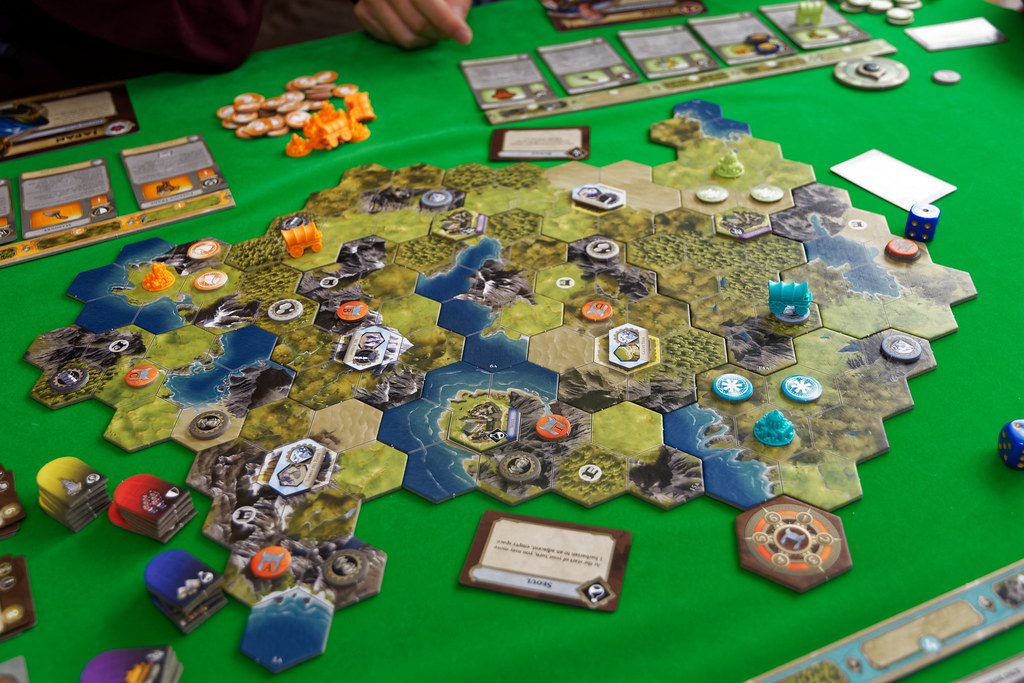The term “4X board game” refers to a strategic gaming genre defined by four core elements: exploration, expansion, exploitation, and extermination. These games challenge players to navigate complex terrains, develop their territories, and engage in intricate interactions with opponents. While the origins of 4X gameplay can be traced back to early computer games, board game adaptations have introduced a rich variety of themes and narratives. What truly distinguishes these games is the depth of strategy involved, inviting a deeper look at their appeal and the dynamics of gameplay.
Key Gameplay Elements
While each 4X game may offer unique scenarios and mechanics, certain fundamental gameplay elements consistently shape the player experience. Exploration, expansion, exploitation, and extermination form the essence of the 4X genre, providing players with a rich array of strategic choices.
Exploration invites players to discover new territories, revealing resources and potential threats. This initial phase fosters a sense of discovery, empowering players to chart their own course. Expansion follows as players establish colonies or settlements, asserting their influence over the game board. This element emphasizes growth and territorial control, allowing players to expand their reach.
Exploitation enables players to utilize resources gathered during exploration, facilitating the development of technologies, military units, and infrastructure. This aspect enhances a player’s capabilities and strategic options. Finally, extermination introduces the competitive edge of 4X games, as players engage in conflict to eliminate rivals and secure their position in the game world.
These core elements intertwine to create a dynamic and immersive experience, where players navigate a vast terrain of choices, ultimately leading to their desired victory. The strategic depth of 4X games offers a liberating experience, encouraging players to forge their own paths to conquest.

Historical Origins and Evolution
The origins of 4X games can be traced back to the early days of computer gaming, where strategic depth and player agency began to take shape. The genre emerged prominently in the 1990s with titles like “Civilization,” which blended exploration, expansion, exploitation, and extermination into a unified gameplay experience. These foundational elements reflected a desire for freedom in decision-making, empowering players to carve their own paths through dynamic worlds.
As technology advanced, so too did the complexity and ambition of 4X games. The introduction of real-time strategies and improved graphics in later decades signified an evolution in gameplay mechanics, allowing for more immersive experiences. This evolution extended beyond the digital realm, inspiring the creation of board games that embraced the 4X ethos.
The increasing popularity of such games can be attributed to a growing community of players seeking intricate narratives and strategic challenges. This desire for freedom of choice and exploration has driven designers to innovate further, ensuring the genre remains vibrant and relevant. Ultimately, the historical journey of 4X games showcases an enduring appeal for players who relish the profound agency and expansive worlds these games offer.
Popular 4X Board Games
Among the most celebrated 4X board games, titles like “Twilight Imperium,” “Eclipse,” and “Civilization: A New Dawn” are known for their intricate gameplay and immersive worlds. These games offer a thrilling mix of exploration, expansion, exploitation, and extermination, allowing players to create their own unique narratives.
Here are three popular 4X games worth exploring:
- Twilight Imperium: This epic game spans several hours and features deep strategic elements, political intrigue, and a vast universe. Players navigate alliances while vying for galactic dominance, making each session a unique story of betrayal and collaboration.
- Eclipse: A game of space exploration and conquest, Eclipse allows players to develop their civilizations, research technologies, and engage in epic battles. The balance between diplomacy and warfare keeps the dynamics engaging.
- Civilization: A New Dawn: Based on the renowned video game series, this streamlined board game emphasizes city-building and resource management. Players advance their cultures through careful planning and strategic decision-making.
These titles exemplify the essence of 4X gameplay and invite players to engage in worlds brimming with potential and freedom.

Strategies for Success
Success in 4X board games relies on mastering key strategies, such as effective resource management for sustainable growth. Additionally, strategic expansion planning helps players optimize territory control while reducing vulnerabilities. Leveraging diplomacy and forming alliances can also provide significant advantages in competitive environments, enabling cooperative strategies that enhance overall gameplay.
Resource Management Techniques
Effective resource management plays a key role in achieving victory in 4X games, where strategic planning and efficient asset allocation can greatly impact gameplay. Players must navigate complex economies and optimize their resources to ensure their civilization thrives amidst competition.
Here are three effective resource management techniques to enhance your gameplay:
- Prioritize Resource Allocation: Determine which resources are essential for immediate needs versus long-term objectives. Direct resources to areas that will provide the greatest return on investment, such as military units for defense or technology upgrades for advancements.
- Diversify Resource Production: Relying on a single resource can be risky. Implement a balanced production strategy that includes a variety of resources—such as food, materials, and energy—to maintain flexibility and adaptability in your strategy.
- Monitor Opponent Moves: Observe your opponents’ resource management patterns. Understanding their resource priorities can help you anticipate their strategies and adjust your own resource allocation as needed.
Strategic Expansion Planning
Expanding your territory is a vital aspect of achieving dominance in 4X board games, following the resource management strategies previously discussed. Strategic expansion planning requires a keen understanding of the map and your adversaries’ movements. Focus on areas rich in resources to enhance your economy and military capabilities.
Timing your expansion is key; early growth can provide a significant advantage, while overextending too quickly may leave your territories vulnerable. Balance aggression with caution, ensuring each new acquisition is defensible.
Employ scouts or reconnaissance units to gather intelligence on potential expansion sites, assessing threats and opportunities. Recognize the strategic value of positioning—cornering your opponents or cutting off their resources can shift the balance of power in your favor.
Adapt your strategy based on the unique traits of your civilization and the dynamics of your opponents. Embrace flexibility in your plans, as the game environment can change rapidly. Ultimately, successful expansion is not just about acquiring more land but about creating a sustainable and fortified empire that supports your overarching goals.
Diplomacy and Alliances
Navigating the complex web of diplomacy and alliances is essential in 4X board games. Players must manage relationships with other factions, as their decisions can lead to mutual benefits or devastating betrayals. Understanding the dynamics of diplomacy can significantly enhance your strategic position and overall success.
Here are three strategies to nurture effective alliances:
- Engage in Open Communication: Establishing clear and honest dialogue promotes trust. Regularly share information about your intentions and concerns to avoid misunderstandings.
- Identify Common Goals: Find objectives that align your interests with those of your allies. Collaborating on shared targets can solidify partnerships and strengthen your collective position against adversaries.
- Negotiate Terms Wisely: When forming alliances, be mindful of the terms. Confirm that agreements are beneficial but also flexible enough to adapt to evolving circumstances.
Comparison With Other Genres
Many enthusiasts are captivated by the unique complexities of 4X games, which distinguish them from other gaming genres. Unlike traditional board games that often center on luck or direct competition, 4X games highlight exploration, expansion, exploitation, and extermination. This multifaceted approach enables players to devise intricate strategies, ensuring that each game is a distinct experience.
In contrast, cooperative games involve players working together towards a shared objective, fostering a sense of camaraderie, but this can restrict individual freedom as strategies must be aligned. On the other hand, party games emphasize social interaction and fast gameplay, often sacrificing depth for entertainment value. While fun, they typically lack the nuanced decision-making and long-term planning that define 4X titles.
Moreover, many strategy games focus on tactical maneuvering rather than the broad scope of empire-building inherent in 4X games. Players engaged in a 4X experience enjoy the freedom to shape their civilization, navigate complex relationships, and confront opponents in a richly layered world. This combination of strategy, diplomacy, and resource management creates a distinctive allure that appeals to those seeking depth in their gaming pursuits.
Solo vs. Multiplayer Experiences
The dynamics of solo gameplay in 4X board games emphasize strategic planning and individual decision-making, allowing players to immerse themselves in the game’s complexities at their own pace. In contrast, multiplayer experiences introduce unique interaction styles, fostering competition and collaboration that can significantly affect gameplay outcomes. Understanding these differences is essential for players looking to enhance their enjoyment and engagement with the genre.
Solo Gameplay Dynamics
Solo gameplay dynamics in board gaming offer unique challenges and opportunities, particularly in 4X games. This solitary experience enables players to fully engage with the game mechanics without the distractions of competing players, fostering deeper strategic thinking.
Here are three key aspects of solo gameplay dynamics in 4X board games:
- Autonomous Decision-Making: Players enjoy complete control over their strategies, allowing for experimentation without the pressure of competition.
- Pacing and Reflection: Solo players can analyze situations at their own pace, adjust strategies, and explore various victory paths, resulting in a more contemplative gaming experience.
- Narrative Development: Playing solo enhances personal storytelling, enabling players to craft unique narratives from their decisions and develop a stronger emotional connection to the game.
Ultimately, solo gameplay in 4X board games provides freedom and flexibility, allowing players to explore the vast possibilities of the gaming environment unencumbered.
Multiplayer Interaction Styles
While solo gameplay in 4X board games provides a personal and introspective experience, multiplayer interactions add a layer of competition and collaboration that impacts strategic decisions. The choice between solo and multiplayer formats significantly shapes the game’s atmosphere, player engagement, and overall enjoyment.
In multiplayer settings, players navigate alliances, rivalries, and negotiations, leading to unpredictable outcomes and richer storytelling. In contrast, solo play allows for a contemplative approach, where players can explore strategies at their own pace without external pressures.
To illustrate the differences between these experiences, consider the following comparison:
| Interaction Style | Solo Gameplay | Multiplayer Gameplay |
|---|---|---|
| Player Engagement | High personal focus | Social interaction |
| Decision Making | Unilateral decisions | Collaborative strategy |
| Game Pace | Self-paced | Variable due to turn order |
| Strategic Depth | In-depth investigation | Dynamic strategy shifts |
| Outcome Variability | Predictable outcomes | Unpredictable outcomes |
Ultimately, whether players desire the freedom of solo exploration or the excitement of multiplayer rivalry, both experiences enhance the world of 4X board games, catering to diverse preferences and playstyles.
The Role of Diplomacy
How does diplomacy shape the dynamics of a 4X board game? In these intricate games, diplomacy serves as a powerful mechanism that can alter alliances, shift power balances, and influence gameplay. Players navigate a landscape filled with both opportunities and threats, making strategic decisions that can lead to cooperation or conflict.
The role of diplomacy can be summarized in three key elements:
- Negotiation: Players frequently engage in discussions to forge alliances or trade agreements. These negotiations can yield mutual benefits, strengthening the strategic positions of both parties.
- Betrayal: While alliances may provide short-term advantages, the possibility of betrayal can create a tense atmosphere. Players must consider the risks of cooperation against the rewards of pursuing their own interests.
- Influence: Diplomacy enables players to sway others’ decisions through persuasion or coercion. This can manifest in subtle tactics that affect resource allocation and territorial control.
Ultimately, diplomacy in a 4X board game enhances the experience, fostering a dynamic interplay of strategy and human interaction, where freedom of choice and consequence prevail.
Visual and Thematic Aspects
Engaging visuals and thematic depth are vital components of a 4X board game, immersing players in richly crafted worlds that enhance the gameplay experience. The artwork—spanning the game board, cards, and tokens—reflects the unique cultures, technologies, and environments that players encounter. High-quality illustrations and meticulously designed components not only boost aesthetic appeal but also reinforce the narrative, allowing players to form a genuine connection with their civilizations.
Thematic elements significantly shape gameplay mechanics and decision-making. Whether players explore uncharted territories, engage in diplomatic negotiations, or wage epic battles, the themes resonate with their actions and choices. For instance, a game set in a dystopian future may focus on resource management and survival, while a fantasy-themed game might highlight magic and mythical creatures.
Ultimately, the visual and thematic aspects of 4X board games foster an immersive atmosphere that invites players to fully engage in strategic pursuits, empowering them to build and expand their empires while enjoying the freedom of choice inherent to the genre. This blend of artistry and narrative cultivates a memorable and fulfilling gaming experience.
Future Trends in 4X Games
As the 4X genre evolves, developers are emphasizing innovative gameplay mechanics to enhance player engagement and strategic depth. The integration of advanced artificial intelligence is poised to transform player interactions with the game world, creating more dynamic and responsive experiences. These trends indicate a future where 4X games become increasingly immersive, challenging, and rewarding.
Evolving Gameplay Mechanics
A growing number of 4X games are embracing innovative gameplay mechanics that enhance player engagement and strategic depth. As the genre evolves, designers are eager to introduce elements that allow players to embark on their journeys in unique and dynamic ways. The following trends exemplify this evolution:
- Modular Board Designs: Many contemporary 4X games utilize modular boards that change each session. This variability fosters a sense of revelation and adapts strategies to new environments, enhancing replayability.
- Dynamic Events: Incorporating random or player-driven events into gameplay can significantly alter the course of a game. These events challenge players to adapt their strategies in real time, offering a more immersive experience that reflects the unpredictability of investigation and conquest.
- Asymmetrical Factions: By designing factions with distinct abilities and playstyles, players are encouraged to explore various strategies and interactions. This asymmetry promotes diverse gameplay encounters, allowing for personal expression and deeper tactical considerations.
These evolving mechanics not only enhance the strategic depth of 4X games but also empower players to enjoy a more tailored and immersive experience, capturing the essence of investigation and conquest.
Enhanced AI Integration
4X games are increasingly embracing advanced artificial intelligence to enhance gameplay experiences and challenge players in innovative ways. This improved AI simulates complex decision-making processes and adapts to player strategies, creating a dynamic environment that evolves with each session. By utilizing machine learning algorithms, developers can craft non-player characters (NPCs) that display more realistic behaviors, making interactions feel more organic and engaging.
Additionally, AI fosters personalized experiences by analyzing player choices and preferences, tailoring challenges that align with individual play styles. For instance, AI can modify its diplomatic tactics based on a player’s history, resulting in a more immersive and responsive gaming atmosphere.
The integration of AI also enriches storytelling, as players navigate procedurally generated narratives influenced by their actions. This enhancement not only boosts replayability but also cultivates a sense of agency, allowing players to witness the tangible effects of their decisions.
As 4X games continue to evolve, the incorporation of sophisticated AI will undoubtedly redefine player engagement, empowering them to investigate, expand, exploit, and exterminate in unprecedented ways. Exciting opportunities for freedom await within the realm of strategy gaming.


